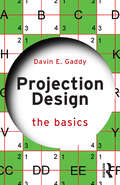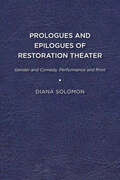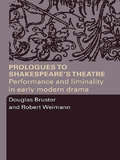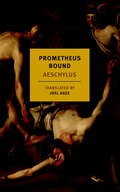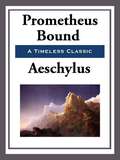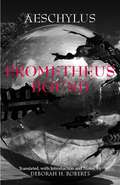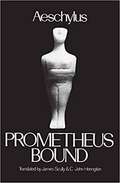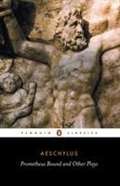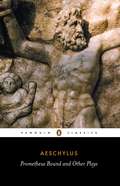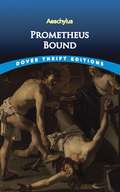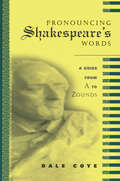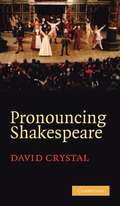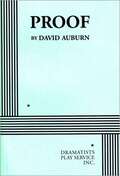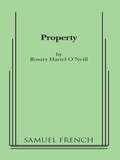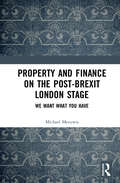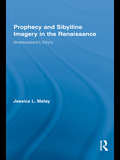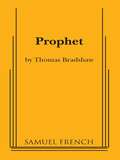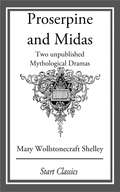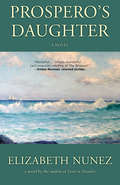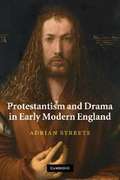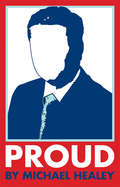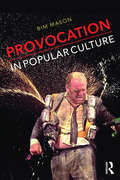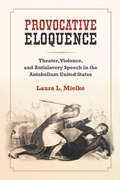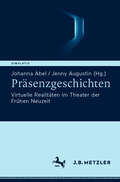- Table View
- List View
Projection Design: The Basics (The Basics)
by Davin E. GaddyProjection Design: The Basics explores the concepts of visual elements in live entertainment. It provides a conversational view of the fundamentals of projection design, from production meetings and the elements of visual design to the equipment necessary to make it all happen.This text examines the themes and theories universal to a wide range of topics, to provide a foundation for anyone interested in using video for their live production or those who are looking where to start as a designer. Topics covered include: Methods of extracting visuals from a script and communicating them to production staff Basics of visual design Understanding human perception and how this influences design How to choose the right equipment to build a system With a detailed glossary, basic formulas, and comprehensive explanation from start to finish, Projection Design: The Basics is an ideal primer for Projection Design courses, and will be of interest to anyone entering the field of projection and media design for the first time.
Prologues and Epilogues of Restoration Theater: Gender and Comedy, Performance and Print
by Diana SolomonOften perceived as merely formulaic or historical documents, dramatic prologues and epilogues – players’ comic, poetic bids for the audience’s good opinion – became essential parts of Restoration theater, appearing in over 90 percent of performed and printed plays between 1660 and 1714. Their popularity coincided with the rise of the English actress, and Prologues and Epilogues of Restoration Theater unites these elements in the first book-length study on the subject. It finds that these paratexts provided the first sanctioned space for actresses in Britain to voice ideas in public, communicate directly with other women, and perform comedy – arguably the most powerful type of speech, and one that enabled interrogation of misogynist social practices. This book provides a taxonomy of prologues and epilogues with a corresponding appendix, and demonstrates through case studies of Anne Bracegirdle and Anne Oldfield how the study of prologues and epilogues enriches Restoration theater scholarship. Published by University of Delaware Press. Distributed worldwide by Rutgers University Press.
Prologues to Shakespeare's Theatre: Performance and Liminality in Early Modern Drama
by Douglas Bruster Robert WeimannThis eye-opening study draws attention to the largely neglected form of the early modern prologue. Reading the prologue in performed as well as printed contexts, Douglas Bruster and Robert Weimann take us beyond concepts of stability and autonomy in dramatic beginnings to reveal the crucial cultural functions performed by the prologue in Elizabethan England.While its most basic task is to seize the attention of a noisy audience, the prologue's more significant threshold position is used to usher spectators and actors through a rite of passage. Engaging competing claims, expectations and offerings, the prologue introduces, authorizes and, critically, straddles the worlds of the actual theatrical event and the 'counterfeit' world on stage. In this way, prologues occupy a unique and powerful position between two orders of cultural practice and perception.Close readings of prologues by Shakespeare and his contemporaries, including Marlowe, Peele and Lyly, demonstrate the prologue's role in representing both the world in the play and playing in the world. Through their detailed examination of this remarkable form and its functions, the authors provide a fascinating perspective on early modern drama, a perspective that enriches our knowledge of the plays' socio-cultural context and their mode of theatrical address and action.
Prometheus Bound
by Aeschylus Joel AgeePrometheus Bound is the starkest and strangest of the classic Greek tragedies, a play in which god and man are presented as radically, irreconcilably at odds. It begins with the shock of hammer blows as the Titan Prometheus is shackled to a rock in the Caucasus. This is his punishment for giving the gift of fire to humankind and for thwarting Zeus's decision to exterminate the human race. Prometheus's pain is unceasing, but he refuses to recant his commitment to humanity, to whom he has also brought the knowledge of writing, mathematics, medicine, and architecture. He hints that he knows how Zeus will be brought low in the future, but when Hermes demands that Prometheus divulge his secret, he refuses and is sent spinning into the abyss by a divine thunderbolt. To whom does humanity look for guidance: to the supreme deity or to the rebel Titan? What law controls the cosmos? Prometheus Bound, one of the great poetic achievements of the ancient world, appears here in a splendid new translation by Joel Agee that does full justice to the harsh and keening music of the original Greek.
Prometheus Bound
by AeschylusAeschylus based his epic drama on the legendary tale of Prometheus, the Titan who stole fire from the gods for the benefit of humanity. Prometheus's terrible punishment remains a universal symbol of human vulnerability in any struggle with the gods, and this ancient play continues to entrance audiences with its timeless appeal.
Prometheus Bound
by Aeschylus Deborah RobertsThis is an outstandingly useful edition of Prometheus Bound. The translation is both faithful and graceful, and the introduction to this difficult play is a model of clarity, intelligence, and a profound familiarity with the workings of Greek myth, Greek literature, and literature in general. --Rachel Hadas, Department of English, Rutgers University
Prometheus Bound (Greek Tragedy In New Translations)
by Aeschylus James Scully C. John HeringtonFor readers accustomed to the relatively undramatic standard translations ofPrometheus Bound, this version by James Scully, a poet and winner of the Lamont Poetry Prize, and C. John Herington, one of the world's foremost Aeschylean scholars, will come as a revelation. Scully and Herington accentuate the play's true power, drama, and relevance to modern times. Aeschylus originally wrotePrometheus Boundas part of a tragic trilogy, and this translation is unique in including the extant fragments of the companion plays.
Prometheus Bound And Other Plays
by Aeschylus Translator Philip Vellacott (Introduction byAeschylus (525-456 BC) brought a new grandeur and epic sweep to the drama of classical Athens, raising it to the status of high art. In Prometheus Bound,the defiant Titan Prometheus is brutally punished by Zeus for daring to improve the state of wretchedness and servitude in which mankind is kept. The Suppliantstells the story of the fifty daughters of Danaus who must flee to escape enforced marriages, while Seven Against Thebesshows the inexorable downfall of the last members of the cursed family of Oedipus. And The Persians,the only Greek tragedy to deal with events from recent Athenian history, depicts the aftermath of the defeat of Persia in the battle of Salamis, with a sympathetic portrayal of its disgraced King Xerxes. Philip Vellacott's evocative translation is accompanied by an introduction, with individual discussions of the plays, and their sources in history and mythology.
Prometheus Bound and Other Plays: The Persians / Prometheus Bound / Seven Against Thebes / The Suppliants (The\complete Greek Tragedies Ser.)
by AeschylusAeschylus (525–456 BC) brought a new grandeur and epic sweep to the drama of classical Athens, raising it to the status of high art. In Prometheus Bound the defiant Titan Prometheus is brutally punished by Zeus for daring to improve the state of wretchedness and servitude in which mankind is kept. The Suppliants tells the story of the fifty daughters of Danaus who must flee to escape enforced marriages, while Seven Against Thebes shows the inexorable downfall of the last members of the cursed family of Oedipus. And The Persians, the only Greek tragedy to deal with events from recent Athenian history, depicts the aftermath of the defeat of Persia in the battle of Salamis, with a sympathetic portrayal of its disgraced King Xerxes.Philip Vellacott’s evocative translation is accompanied by an introduction, with individual discussions of the plays, and their sources in history and mythology.
Prometheus Bound: Translated From The Greek (classic Reprint) (Dover Thrift Editions)
by AeschylusIn Greek legend, Prometheus was the Titan who, against the will of Zeus, stole fire from the gods for the benefit of man. His terrible punishment by Zeus, and his continuing defiance of Zeus in the face of that punishment, remain universal symbols of man's vulnerability in any struggle with the gods.In the epic drama Prometheus Bound, Aeschylus (c. 525-456 BC), first of the three great Greek tragic poets, re-creates this legendary conflict between rebellious subject and vengeful god. Chained for eternity to a barren rock, his flesh repeatedly torn by a ravaging eagle, Prometheus defends his championship of mankind, rejoicing in the many gifts of language and learning he has given man despite Zeus's cruel opposition.Inspired by Prometheus's spirit, Aeschylus reaches beyond the myth to create one of literature's most gripping portrayals of man's inhumanity to man. How Prometheus clings to his convictions and braves his harsh fate give Prometheus Bound its extraordinary vitality and appeal. For over 2,000 years, this masterpiece of drama has held audiences enthralled. It is reprinted here in its entirety from the translation by George Thomson.
Pronouncing Shakespeare's Words
by Dale CoyeHow do you pronounce zounds, Milan, housewife and hundreds of other words in Shakespeare's plays? In this ingenious book, Dale Coye has provided a guide to each significant word, line-by line, scene-by-scene, in twenty of Shakespeare's most popular plays. More than a simple pronouncing dictionary, Pronouncing Shakespeare's Words pays attention to scansion, displays alternative pronunciations in different centuries and geographical areas, and provides a simple pronunciation guide requiring no knowledge of lexicographic symbols. Now available in an affordable paperback edition, Pronouncing Shakespeare's Plays will become a vade mecum (pronounced VAH-day MAY-cum) for actors, students, and general readers of Shakespeare.
Pronouncing Shakespeare's Words: A Guide From A To Zounds
by Dale CoyeFirst published in 2003. Routledge is an imprint of Taylor & Francis, an informa company.
Pronouncing Shakespeare: The Globe Experiment
by David CrystalIn an unusual blend of autobiography, narrative, and academic content, reflecting the unique nature of the experience, David Crystal recounts the first attempt in over 50 years to mount a full-length Shakespeare play in original pronunciation.
Proof
by David AuburnOne of the most acclaimed plays of the 1999-2000 season, Proof is a work that explores the unknowability of love as much as it does the mysteries of science. <p><p> It focuses on Catherine, a young woman who has spent years caring for her father, Robert, a brilliant mathematician in his youth who was later unable to function without her help. His death has brought into her midst both her sister, Claire, who wants to take Catherine back to New York with her, and Hal, a former student of Catherine's father who hopes to find some hint of Robert's genius among his incoherent scribblings. <p><p> The passion that Hal feels for math both moves and angers Catherine, who, in her exhaustion, is torn between missing her father and resenting the great sacrifices she made for him. For Catherine has inherited at least a part of her father's brilliance -- and perhaps some of his instability as well. As she and Hal become attracted to each other, they push at the edges of each other's knowledge, considering not only the unpredictability of genius but also the human instinct toward love and trust.
Property
by Rosary Hartel O'NeillFull Length, Southern ComedyCharacters: 2 male, 3 female. Unit set. Property is a contemporary romantic comedy set in a Garden District mansion in New Orleans. Rooster Dubonnet, a young artist suffering from a terminal disease, is dazzled by love. Raised by an imperious society-driven mother, he has fallen in love with a New-Age nurse. Set during Mardi Gras--when a whole tradition of fun, revelry, and prestige seizes the city-- Rooster is caught between his dedication to his family's past (and "property") and his own very different future. . Also available in Ghosts of New Orleans.
Property and Finance on the Post-Brexit London Stage: We Want What You Have
by Michael MeeuwisA guide to the contemporary London stage as well as an argument about its future, the book walks readers through the city’s performance spaces following the Brexit vote. Austerity-era London theatre is suffused with the belief that private ownership defines full citizenship, its perspective narrowing to what an affluent audience might find relatable. From pub theatres to the National, Michael Meeuwis reveals how what gets put on in London interacts with the daily life of the neighbourhoods in which they are set. This study addresses global theatregoers, as well as students and scholars across theatre and performance studies—particularly those interested in UK culture after Brexit, urban geography, class, and theatrical economics.
Prophecy and Sibylline Imagery in the Renaissance: Shakespeare’s Sibyls (Routledge Studies In Renaissance Literature And Culture Ser. #15)
by Jessica L. MalayThis book restores the rich tradition of the Sibyls to the position of prominence they once held in the culture and society of the English Renaissance. The sibyls — figures from classical antiquity — played important roles in literature, scholarship and art of the period, exerting a powerful authority due to their centuries-old connection to prophetic declamations of the coming of Christ and the Apocalypse. The identity of the sibyls, however, was not limited to this particular aspect of their fame, but contained a fluid multi-layering of meanings given their prominence in ancient Greek and Roman cultures, as well as the widespread dissemination of prophecies attributed the sibyls that circulated through the oral tradition. Sibylline prophecy of the Middle Ages served as another conduit through which sibylline authority, fame, and familiarity was transmitted and enhanced. Writers as disparate as John Foxe, John Dee, Thomas Churchyard, John Fletcher, Thomas Heywood, Jane Seager, John Lyly, An Collins, William Shakespeare, and many draw upon this shared sibylline tradition to produce particular and specific meanings in their writing. This book explores the many identities, the many faces, of the prophetic sibyls as they appear in the works of English Renaissance writers.
Prophet
by Thomas BradshawFull Length, Satire . Characters: 4 male, 3 female . Simple settings . A man wakes up one morning and decides he must kill himself. He is angry with himself for not hitting his wife every time she has an independent thought (as Abraham and Moses would have done). After she dies and God reveals to him that he is the new Prophet, the man takes a new wife, dresses her in slave chains, and begins to preach his newfound gospel of male domination. Simultaneously humorous and disturbing, Bradshaw's Prophet explores controversial issues in startling and unexpected ways. . "Fasten your seatbelts. PROPHET, Thomas Bradshaw's lacerating satire,...hurtles from rambunctious mockery to real horror. This is situation satire with a vengeance..."-The New York Times . This play contains scenes of a graphic sexual and violent nature that may not be suitable for all audiences.
Proserpine and Midas: Two unpublished Mythological Dramas
by Mary Wollstonecraft ShelleyMary Shelley (née Mary Wollstonecraft Godwin, often known as Mary Wollstonecraft Shelley) was a British novelist, short story writer, dramatist, essayist, biographer, travel writer, and editor of the works of her husband, Romantic poet and philosopher Percy Bysshe Shelley. She was the daughter of the political philosopher William Godwin and the writer, philosopher, and feminist Mary Wollstonecraft. Mary Shelley was taken seriously as a writer in her own lifetime, though reviewers often missed the political edge to her novels. After her death, however, she was chiefly remembered only as the wife of Percy Bysshe Shelley and as the author of Frankenstein. It was not until 1989, when Emily Sunstein published her prizewinning biography Mary Shelley: Romance and Reality, that a full-length scholarly biography analyzing all of Shelley's letters, journals, and works within their historical context was published. The well-meaning attempts of Mary Shelley's son and daughter-in-law to "Victorianise" her memory through the censoring of letters and biographical material contributed to a perception of Mary Shelley as a more conventional, less reformist figure than her works suggest. Her own timid omissions from Percy Shelley's works and her quiet avoidance of public controversy in the later years of her life added to this impression. The eclipse of Mary Shelley's reputation as a novelist and biographer meant that, until the last thirty years, most of her works remained out of print, obstructing a larger view of her achievement. She was seen as a one-novel author, if that. In recent decades, however, the republication of almost all her writings has stimulated a new recognition of its value. Her voracious reading habits and intensive study, revealed in her journals and letters and reflected in her works, is now better appreciated. Shelley's recognition of herself as an author has also been recognized; after Percy's death, she wrote about her authorial ambitions: "I think that I can maintain myself, and there is something inspiriting in the idea". Scholars now consider Mary Shelley to be a major Romantic figure, significant for her literary achievement and her political voice as a woman and a liberal.
Prospero's Daughter: A Novel
by Elizabeth NunezProspero's Daughter is a brilliantly conceived retelling of Shakespeare's The Tempest set in a remote corner of the author's native Trinidad during the height of tensions between Trinidadians and British Colonial rule. Above all, it is the story of a boy and a girl who form an unlikely and forbidden alliance to uncover a terrible secret.
Protestantism and Drama in Early Modern England
by Adrian StreeteContaining detailed readings of plays by Shakespeare, Marlowe and Middleton, as well as poetry and prose, this book provides a major historical and critical reassessment of the relationship between early modern Protestantism and drama. Examining the complex and painful shift from late Medieval religious culture to a society dominated by the ideas of the Reformers, Adrian Streete presents a fresh understanding of Reformed theology and the representation of early modern subjectivity. Through close analysis of major thinkers such as Augustine, William of Ockham, Erasmus, Luther and Calvin, the book argues for the profoundly Christological focus of Reformed theology and explores how this manifests itself in early modern drama. Moving beyond questions of authorial 'belief', Streete assesses Elizabethan and Jacobean drama's engagement with the challenges of the Reformation.
Proud
by Michael HealeyShortly after the Conservatives win a majority government in the 2011 federal election, the prime minister discovers a secret weapon in his caucus—Jisbella Lyth, a single mother with a limited understanding of her role as an MP. Using her ignorance to his advantage, the PM hatches a plan to have Jisbella front and centre in a campaign of misdirection and distraction. Humorous and clever, Proud explores the corrosive nature of the politics of division.
Provocation in Popular Culture
by Bim MasonWhat role can provocation play in the process of renewal, both of individuals and of societies? Provocation in Popular Culture is an investigation into the practice of specific provocateurs and the wider nature of cultural provocation, examining, among others: Banksy Sacha Baron Cohen Leo Bassi Pussy Riot Philippe Petit Archaos. Drawing on Bim Mason’s own twenty-five year career as performer, teacher and creative director, this book explores the power negotiations involved in the relationship between provocateur and provoked, and the implications of maintaining a position on the ‘edge’. Using neuroscience as a bridge, it proposes a similarity between complexity theory and cultural theories of play and risk. Three inter-related analogies for the ‘edge’ on which these performers operate – the fulcrum, the blade and the border – reveal the shifts between structure and fluidity, and the ways in which these can combine in a single moment.
Provocative Eloquence: Theater, Violence, and Antislavery Speech in the Antebellum United States
by Laura L MielkeIn the mid-19th century, rhetoric surrounding slavery was permeated by violence. Slavery’s defenders often used brute force to suppress opponents, and even those abolitionists dedicated to pacifism drew upon visions of widespread destruction. Provocative Eloquence recounts how the theater, long an arena for heightened eloquence and physical contest, proved terribly relevant in the lead up to the Civil War. As antislavery speech and open conflict intertwined, the nation became a stage. The book brings together notions of intertextuality and interperformativity to understand how the confluence of oratorical and theatrical practices in the antebellum period reflected the conflict over slavery and deeply influenced the language that barely contained that conflict. The book draws on a wide range of work in performance studies, theater history, black performance theory, oratorical studies, and literature and law to provide a new narrative of the interaction of oratorical, theatrical, and literary histories of the nineteenth-century U.S.
Präsenzgeschichten: Virtuelle Realitäten im Theater der Frühen Neuzeit (Simulatio. Theatertechniken in Literatur, Medien und Wissenschaft)
by Jenny Augustin Johanna AbelBei einem Blick auf virtuelle Realitäten im frühneuzeitlichen Theater gilt es, unsere vom digitalen Zeitalter geprägten Konzepte der Virtualität und Präsenz zu revidieren. Auf dem Gebiet der Kulturen der Romania haben multiple Präsenz- und Virtualitätsverständnisse eine lange und kontroverse Geschichte. In der Auseinandersetzung mit der Vorgeschichte erweiterter Realitätserfahrungen am Modell des Theaters geht es vor allem um die Einbettung von Vergegenwärtigungstechniken in verflochtene Geschichten und vielschichtige Narrationen vom wirkmächtig Virtuellen. Hier werden daher Präsenzgeschichten im Plural in diversen Medien und epistemischen Erzeugungskontexten durchgespielt.
